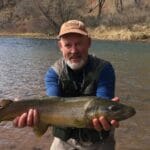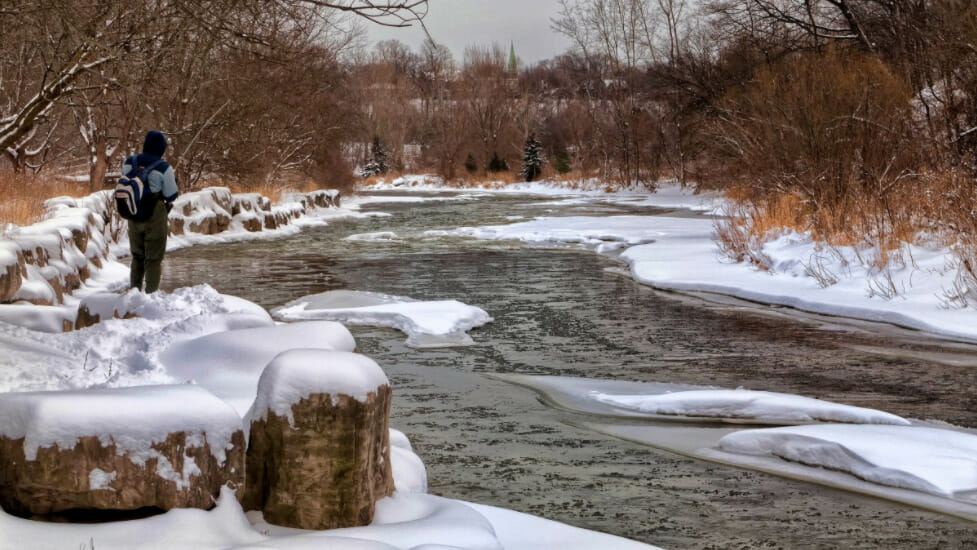One learns not to expect much when fly fishing during the winter months. At least around here, or if you’re me. Regardless of the season, sometimes you step into a river and just know something’s off. The water’s not moving right, or the sound of the wind rings particularly empty and distant. I envy steelhead die-hards their familiarity with this feeling, the impending, inevitable void, and how they march into it undaunted.
A guy I know insisted on fishing only one fly at a time. On a trip to the lower Sacramento, when 90 percent of the bite was either baetis or caddis nymphs, the fish invariably hit the type he wasn’t imitating at a particular moment. Another friend has reached a point in life where he can’t seem to get on the water before eleven o’clock in the morning or keep fishing after five. His complaints of catching few fish fall on deafer ears these days, for obvious reasons.
I remember a day on the San Juan when any or all of my crew had a fish on the line every time I dug into my fly boxes to find something that might possibly draw a strike. After hours of trying to get over my skunk unassisted, I sulked over to each of them and studied their rigs and flies. But by day’s end, when my friends had lost count of the fish they had caught, I had run so many different rigs that I’d forgotten which ones I’d tried and which I’d only thought about. And so I never got off the schneid.
My younger brother didn’t and still kind of doesn’t care about the nitty gritty details of fishing, the gear, how it’s used and why. He doesn’t worry about lengths or weights, and if his 5X leader has gotten chopped back to the diameter of a chairlift cable, that’s how he fishes it. Sometimes this happenstance method produces fabulous results, as on a day on the Madison when he was nailing trout on every cast while I was getting nothing but whitefish.
Through the final hours of that final day of our trip, I watched him dip his net into the Madison and scoop up trout after trout. Frustration finally got the best of me. I waded over, demanded to see his rod and imitated his rig exactly. I went back to my run and began landing trout as often as Pete was. All that made the difference, I discovered, was the amount of shot we were using. I would have been doomed had I not hassled him, and I’ve since concluded that pride is like a fat mouthful of unsweetened oatmeal. More chewing comes to nothing while simply swallowing will let you move on with your day and possibly make a success of it.
This approach can be especially helpful when the odds of a pleasant fishing outcome are slim. When I climbed trees for a living, we didn’t work on rainy days and so the obvious thing to do was go fishing. Except in northern California, rain is not measured in inches but in days or, depending on your preferred destination, thousands of cubic feet per second.
There are skunks you make and skunks you take, and as we know well, the two are often the same thing.
With roily brown water all but assured, we learned to fish in theoretical space (“technically, it’s not impossible for a fish to be in this spot, see this fly and even eat it”) and to ignore the rising rivers and cold fingers. Sometimes fish were caught. Mostly they were not.
On more than one occasion, what began as a day trip turned into an overnighter. We once hunted for clear water all the way up to the Oregon border, finally settled on the least muddyish water of the Smith where, amazingly, Joe got a brief grab from a steelhead while dapping his fly below a pencil sinker in some flooded bankside willows. If pride had its way, we’d have bailed three days, several hundred miles, and about a foot of rain earlier.
There are skunks you make and skunks you take, and as we know well, the two are often the same thing. You didn’t have to insist on fishing that streamer throughout a blizzard caddis hatch. You didn’t have to go fishing when it was sub-zero out, at the peak of the biggest snow melt your river has seen in 15 years, or, in New Mexico’s case, any day during a mega-drought. No one forced you to go ice fishing or target pike, but you did and you paid for it.
Remember, though, that you get what you deserve no matter how things turn out. If I’d have listened to myself and not fished the Yuba that one day after a week of raunchy weather, I might never have learned that the river’s rainbows will rise to skwala adults through some pretty dirty water. If I’d never learned that, it might never have occurred to me that they would do the same thing during the March Brown hatch.
Some of the best fishing I’ve had resulted from what I thought were mistakes. Hopefully our skunks won’t visit us at our deathbeds, or if they do, may we be thankful that on those long ago days, we had absolutely nothing better to do.
Toner Mitchell is TU’s water and habitat coordinator for New Mexico.



